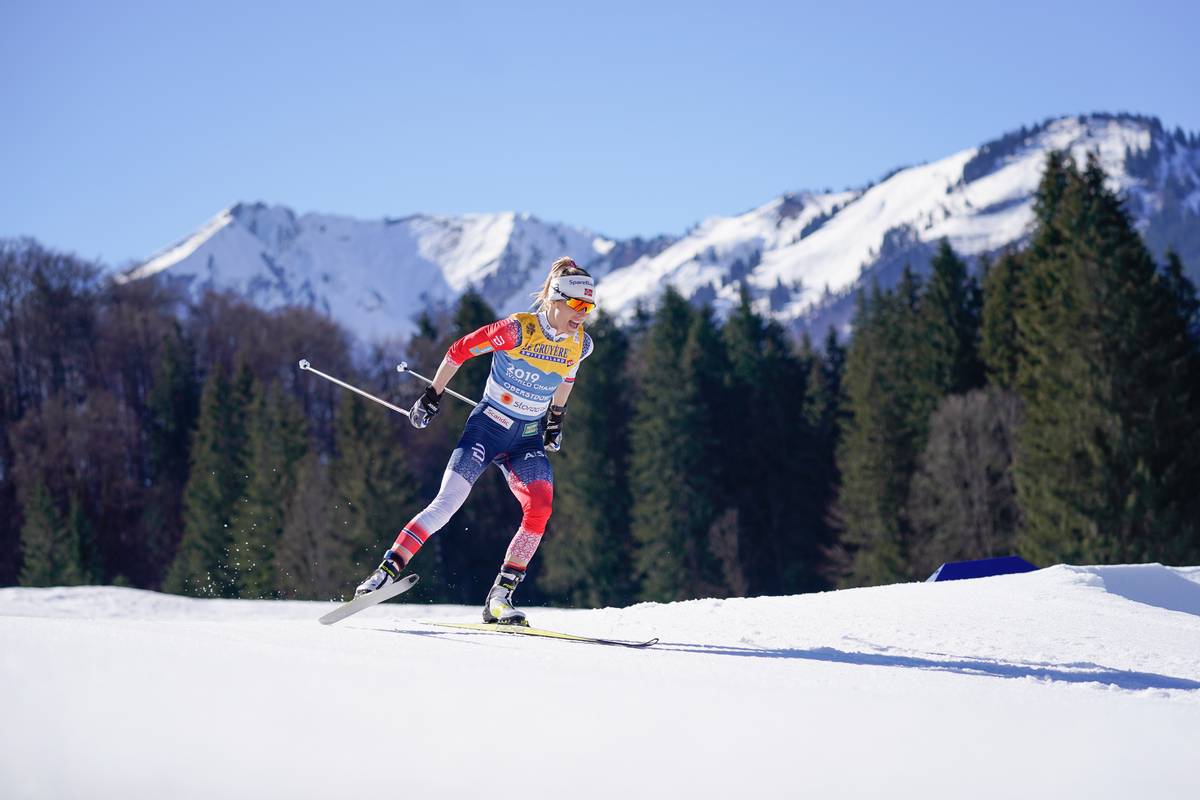
This World Championship coverage is made possible through the generous support of Marty and Kathy Hall and their A Hall Mark of Excellence Award. To learn more about A Hall Mark of Excellence Award or to learn how you can support FasterSkier’s coverage please contact info@fasterskier.com.
The high pressure continued at the 2021 World Championships on Tuesday in more ways than one. Oberstdorf, Germany’s temps hovered around 50 degrees Fahrenheit for the start of the women’s 10-kilometer individual freestyle, and a rarefied number of skiers poised to step on the podium. The pressure cooker that is the individual start, with skiers setting off at 30-second intervals was on display from the first earnest pole plants out of the start.
Coined the “Tempo-Fest” by some who see a Therese Johaug sweep of the distance events as a foregone conclusion – this appeared to be true considering the early splits. The former two-time winner of the 10 k, (2013 in skate, and 2019 classic), the Norwegian’s medal case was already being prepared at the 1.5 k split. She cranked through 3.0 seconds faster than Sweden’s Frida Karlsson and 6.3 seconds ahead of the third-fastest split from the U.S. skier Rosie Brennan. Sweden’s Ebba Andersson notched the fourth-fastest split (+6.8), and American Jessie Diggins, the only skier to best Johaug in this discipline since 2016, was fifth through the split (+7.1).

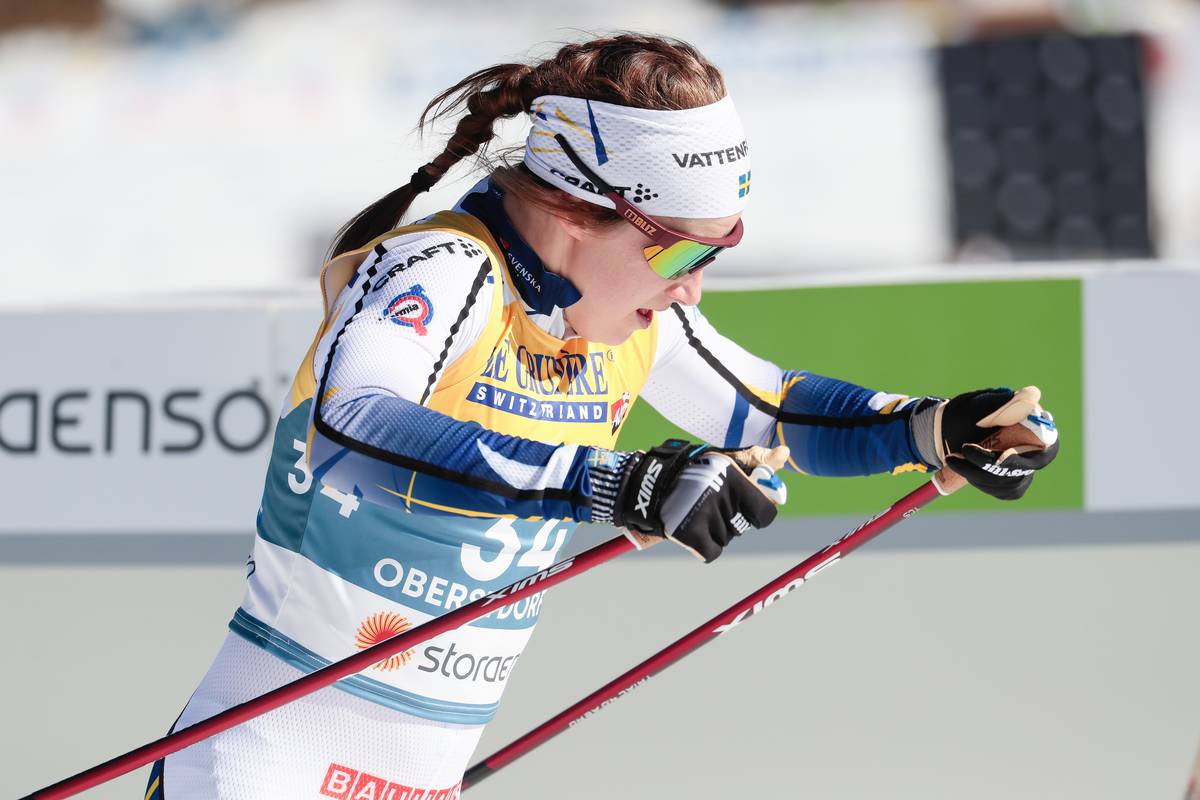
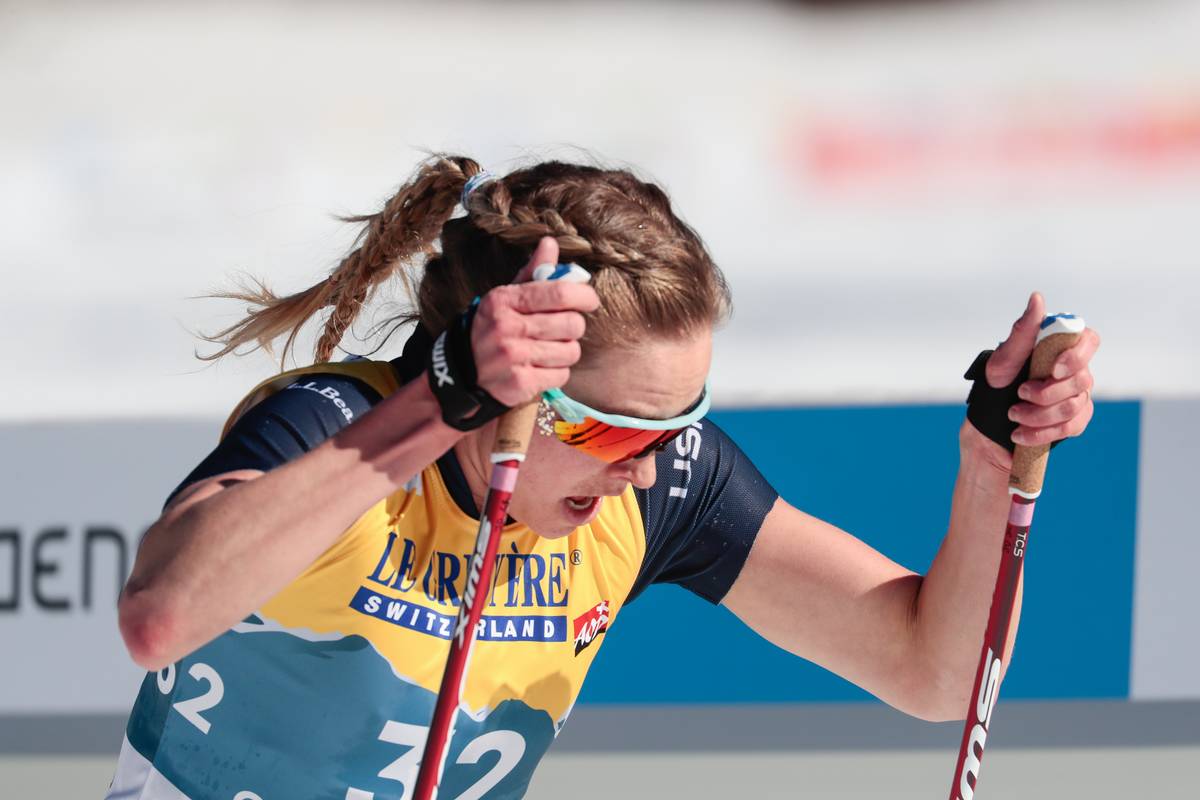
The justification of noting such early splits with a full 8.5 k of racing to go is this: any time back to Johaug is historically time lost – never to be gained back. That was the case on Tuesday when Johaug had 8.6 seconds over the second-fastest skier, Karlsson, at 5 k – the race midpoint – and 19.8 seconds and 21.3 seconds over Andersson and Diggins, respectively.
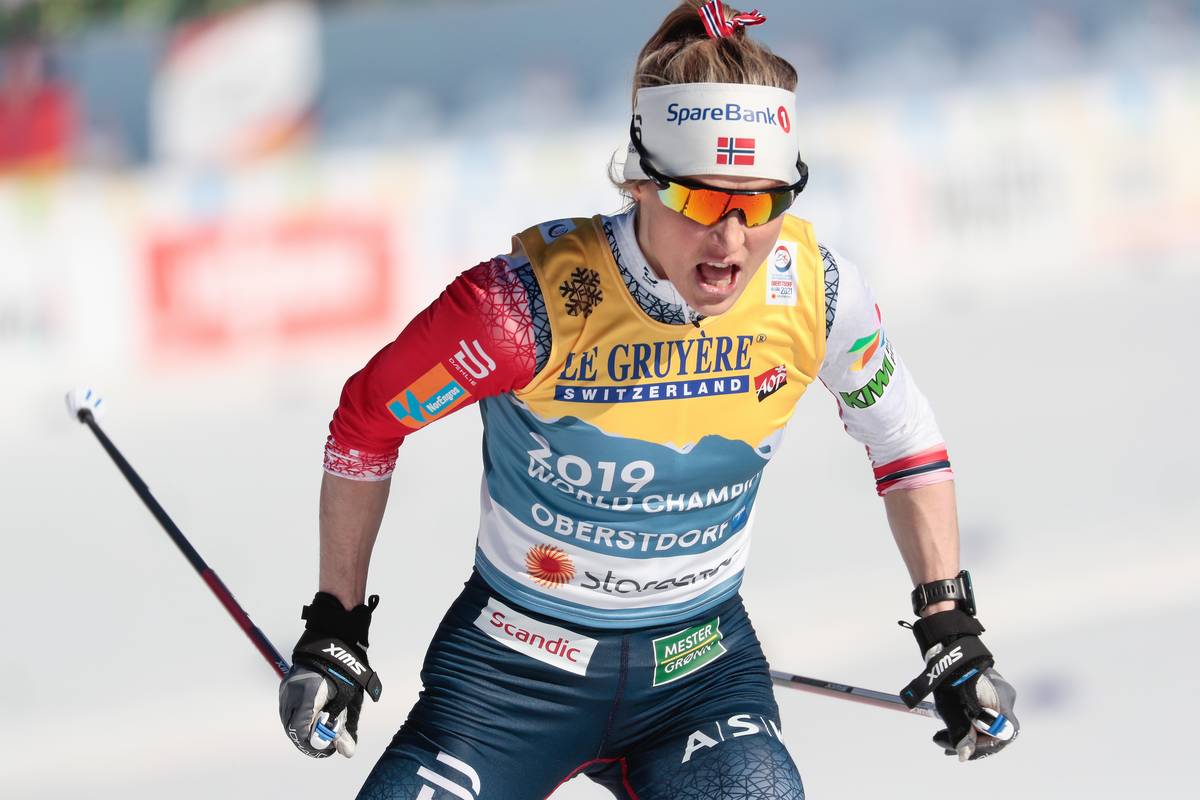
With the open mind thinking that anything can happen but with the caveat that Johaug is a one-of-a-kind skier – this race appeared to be signed, sealed, and delivered to Johaug by 6.8 k, when she led by 18.1 seconds over Karlsson in second.
Johaug won amidst a crowd-less and sunbaked stadium in 23:09.8 to capture her 12th World Championship medal and her second in Oberstdorf after she won the 15 k skiathlon on Saturday. Adding to the accolades, Johaug becomes the first woman to win the 10 k at successive World Champs since Katerina Neumannová of the Czech Republic in 2005 and 2007.
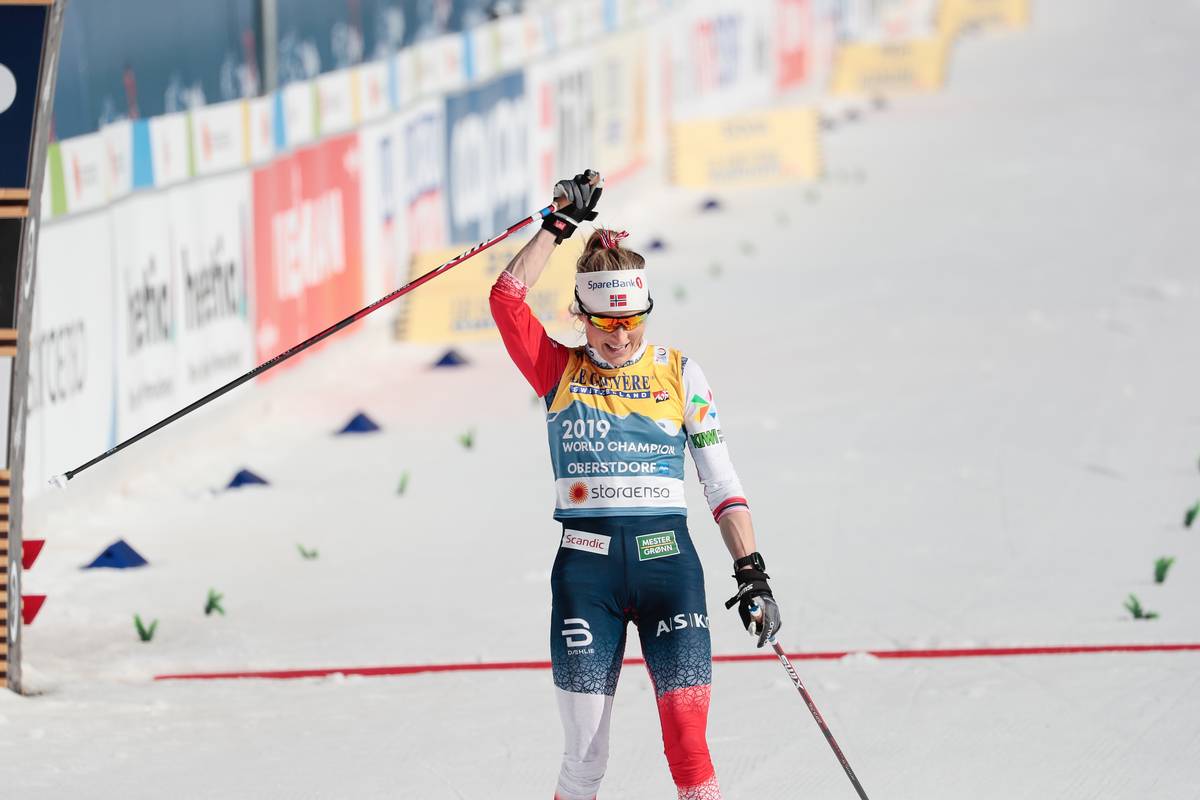
“I think I had the day of my season this year,” Johaug told FIS. “I felt incredibly strong and fresh and really have to give thanks to my amazing team of waxers. They are out day and night to test and find the best option for the race. This victory is really dedicated to all of my team and I am really happy to repeat my title”.
For the 21-year-old Karlsson, she captured silver finishing +54.2 seconds back. In 2019, Karlsson also placed second to Johaug in the World Championship 10 k classic. Her teammate Andersson was third (+1:06.9) on Tuesday. Johaug’s win by nearly a minute is peerless when examining the margin of victory in World Championship or Olympics 10 ks back to 2000. (Information listed below compiled by Erik Nilsson.)
2019 Seefeld WC , Johaug +12
2018 PyeongChang Olympics , Haga +20
2017 Lahti WC, Bjørgen +41
2015 Falun WC , Kalla +41 (Norway missed skis)
2014 Sochi Olympics , Kowalczyk +18
2013 Val di Fiemme WC, Johaug +10
2011 Oslo WC, Bjørgen +4
2010 Vancouver Olympics, Kalla +6
2009 Liberec WC, Saarinen +4
2007 Sapporo WC, Neumanova +26
2006 Turin Olympics, Smigun, +21
2005 Oberstdorf WC , Neumanova +1
2003 Val di Fiemme WC , Skari, +21
2002 Salt Lake Olympics, Skari, +4
2001 Lahti WC, Skari, +12
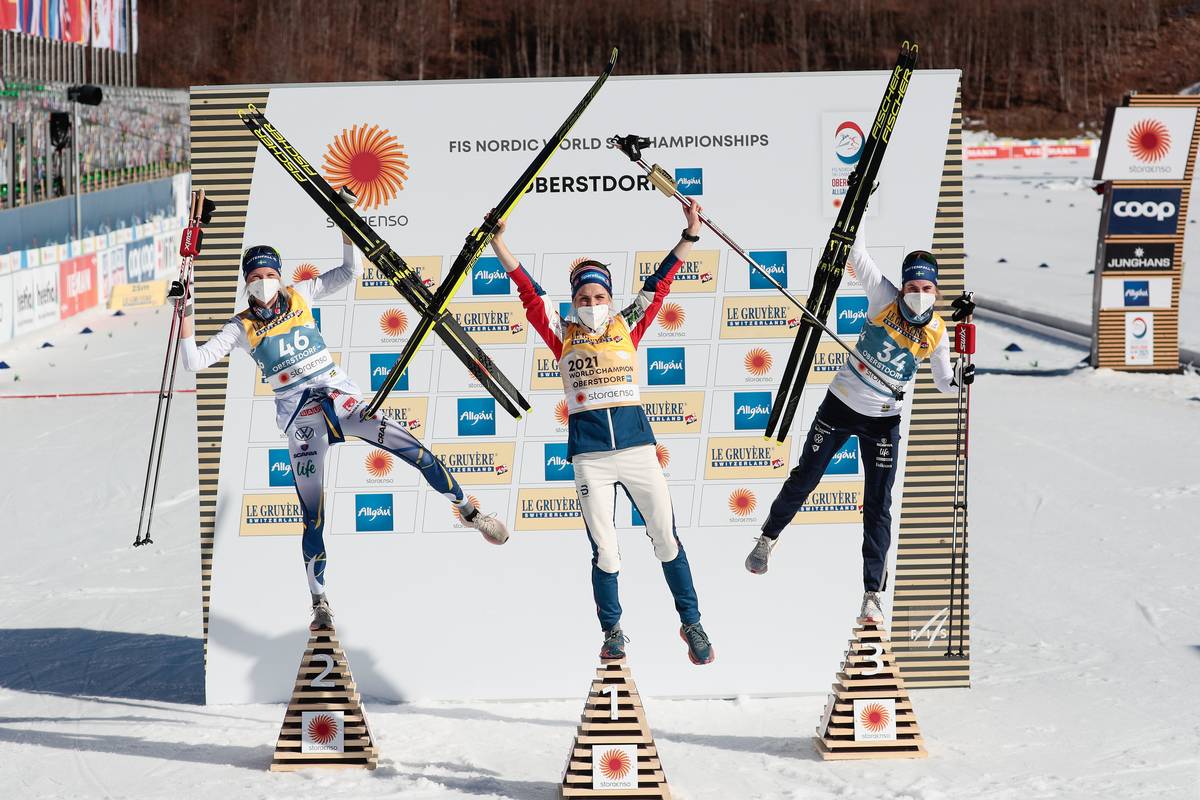
Diggins, who raced in a scissor-modified race suit to create shorts and short sleeves, placed fourth (+1:04.0) in what was tight racing. She and Andersson remained in close virtual contact when considering splits – with the Swede slightly ahead after the 5 k mark. Of the leaders in the final standings, Diggins was the earliest starter in bib 32. Johaug began in bib 40, Karlsson in bib 46, Andersson in bib 34, and Russia’s Tatiana Sorina (racing under the banner RSF due to a CAS ruling) who finished fifth (+1:13.8), in bib 44. Charlotte Kalla, the storied champion from Sweden was sixth (+1:09.4).
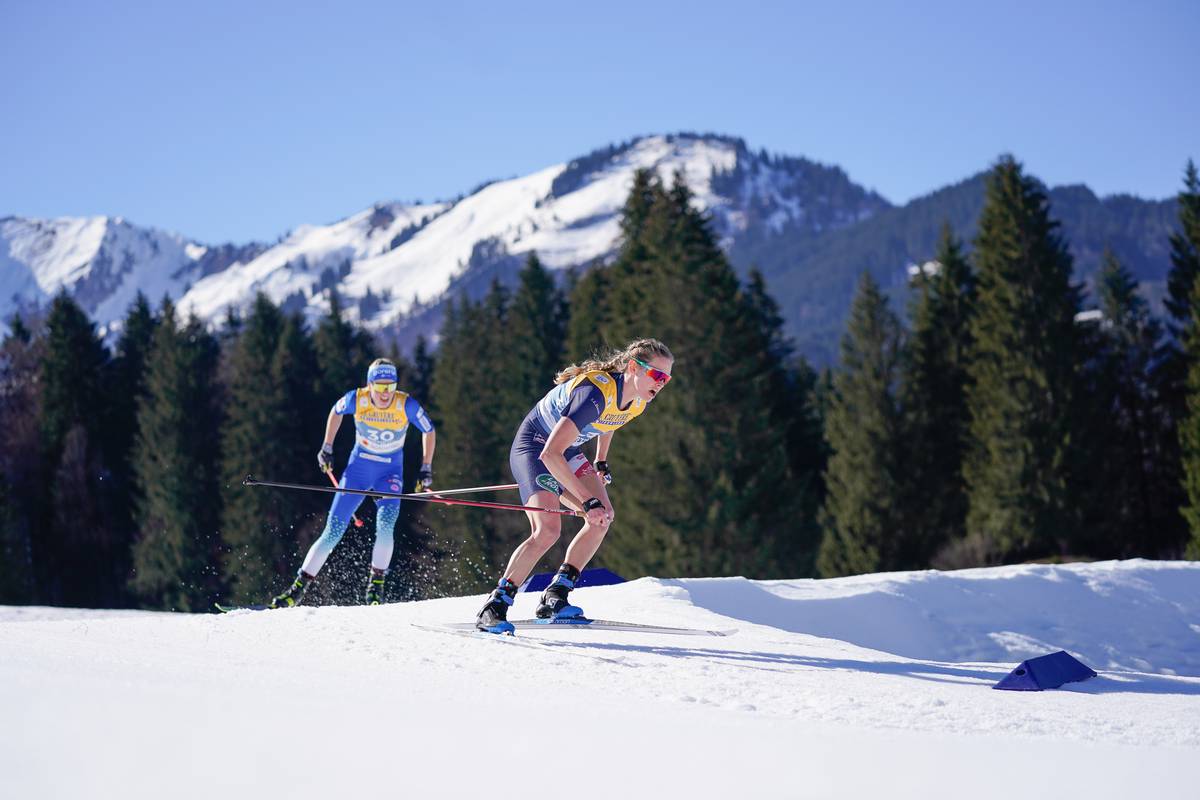
“It’s no secret that I really struggle, these are not my temperatures, I’m more of a Minnesota winter athlete,” Diggins said after the race to the U.S. Ski team when asked about high temperatures. “But for me, I was really proud of our heat mitigation strategies. I’ve been working really hard on trying to acclimate to the heat, I was hydrating like crazy, cut the legs cut the arms off the suit, spritzed my suit with cold water, packed a bunch of snow into my sports bra before the start, and had coaches throwing water on me multiple times and I still got hot. But all that said, that is all I can control. I went out there and, you know, my goal for today was to just be the person who gives, the most. I’ve been visualizing this course for weeks. I practiced in my mind how I wanted to ski it. I went out there and I just skied so hard, and I’m so proud of that because that’s the only thing you can control.”
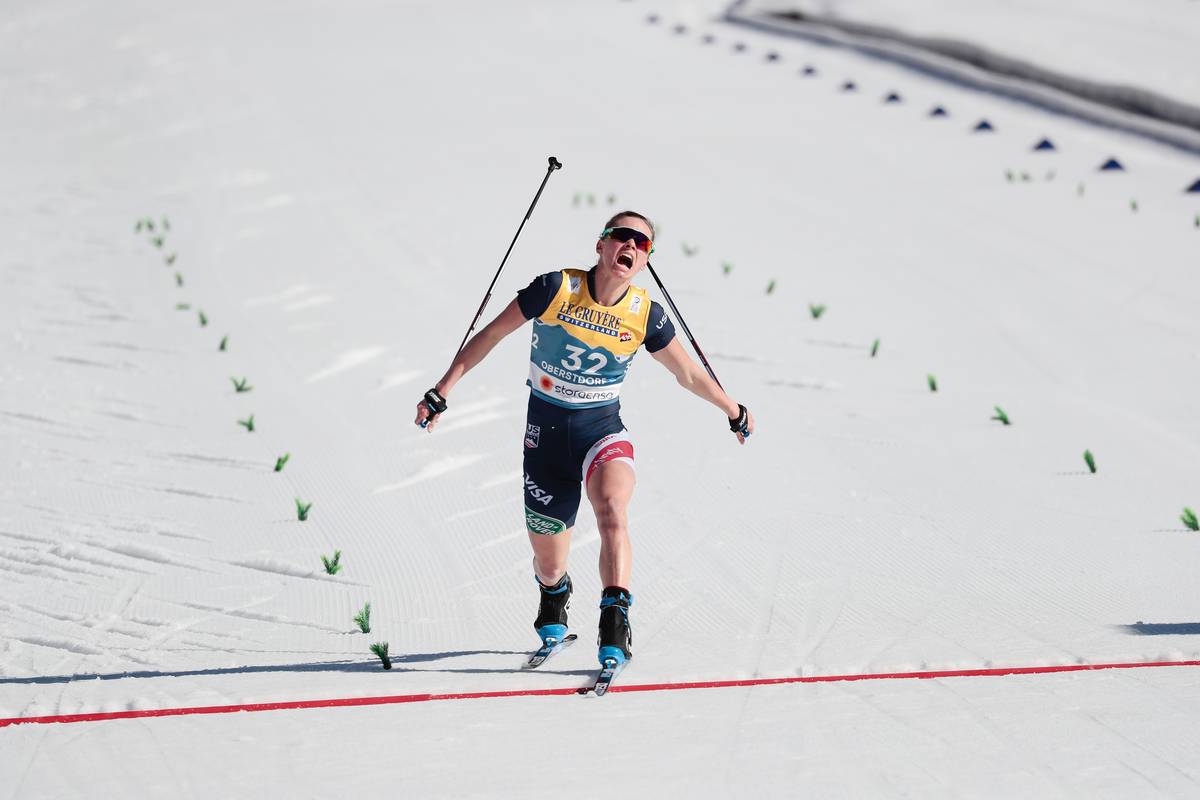
The U.S., which has never medaled at a championship in the women’s 4 x 5 k relay, should be positioned for a solid day on Thursday when that competition goes down. “Just excited for that relay,” said Diggins when asked if she had anything to add.
Unequivocally the skis and the form were solid across the board for the U.S. Beyond Diggins’ near-podium, all four U.S. skiers finished in the top-25. Sadie Maubet Bjornsen, who remained off the WorldCup until recently, raced to 11th (+1:47.8).


“I do feel like I skied with like just no fear out there, and whenever that happens, I’m proud of it,” said Maubet Bjornsen to the USST. “A number is what it is at the end of the day, but I am, I’m really stoked about the fearless energy I went with on those insane hills with. I think you can hear me breathing from literally a kilometer away.
“A number is hardly a measure of today’s effort. I am more of a power skier. So the mountains like that can sometimes break me to pieces and I feel like I just went after them, pretending they were flat and they beat me up no doubt but I feel like I give him a run for their money.”
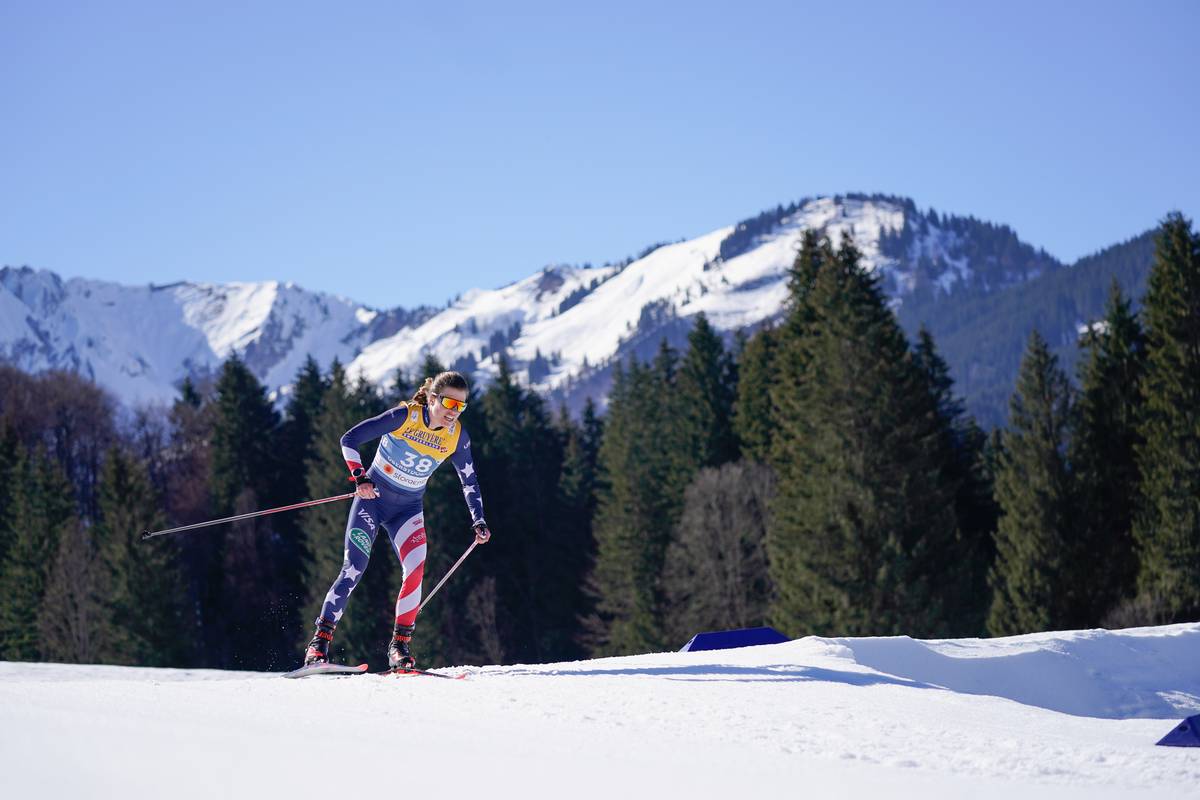
Rosie Brennan, who barnstormed the World Cup during Period I and charged at the Tour de Ski, finished in 17th (+2:03.3).
“It was tough, I feel pretty crushed, to be honest,” said Brennan to the USST. “I started really well and things were going fine and then I don’t know, slowly just the wheels came off and I didn’t have the body or the brain that I had hoped for. And so it was kind of like a brutal battle to the end.”
Brennan had the fifth-fastest split (+13.2) at 2.5 k, and the seventh fastest at 7k (+33.1). By 7.9 k she lost more time to the leaders, coming through in 12th (+1:38.0).
Asked if perhaps she had started too fast, Brennan said, “I mean it’s hard to say, of course, it looks that way on the splits but I also believe that I’m capable of skiing 10 k at that level. And I think I’ve shown that this season so I think, on a good day I could have held it. And I felt I had to try. So I did plan to go out, you know, relatively hard. And maybe it was just like a little much for the heat or just the body that I have right now but solid five K so hopefully I can turn it around for the 5 k in the relay.”
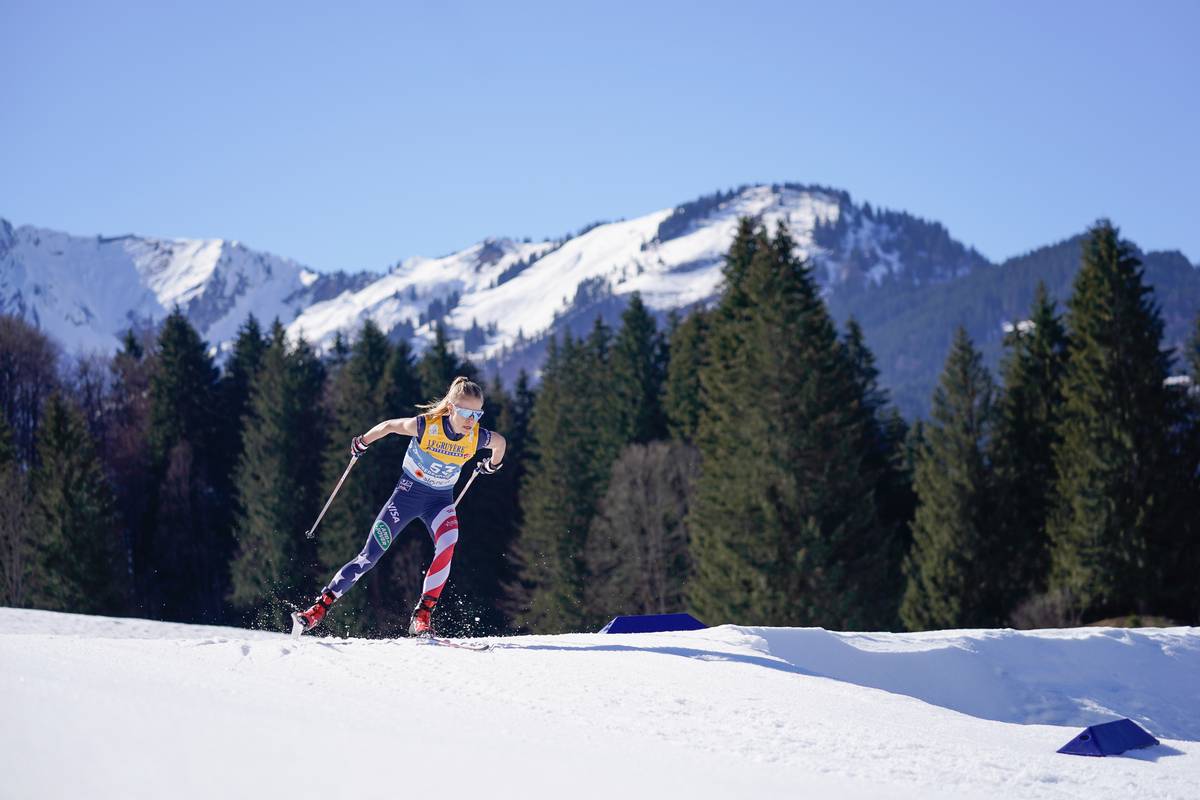
Also for the U.S., Sophia Laukli (20), skied to 23rd (+2:23.0).
“I definitely thought it was gonna be slushier than it was,” Laukli said to the USST post-race. “But in the past few days skiing here in the shady areas have been super different than like what’s in the sun. But today was pretty consistent so that was a nice surprise I guess.”
In her first World Championships, Laukli now has two top-30 results – she placed 25th in Saturday’s skiathlon. This is her first season racing World Cups with a top result of 33rd on the Lahti, Finland skiathlon in late January.
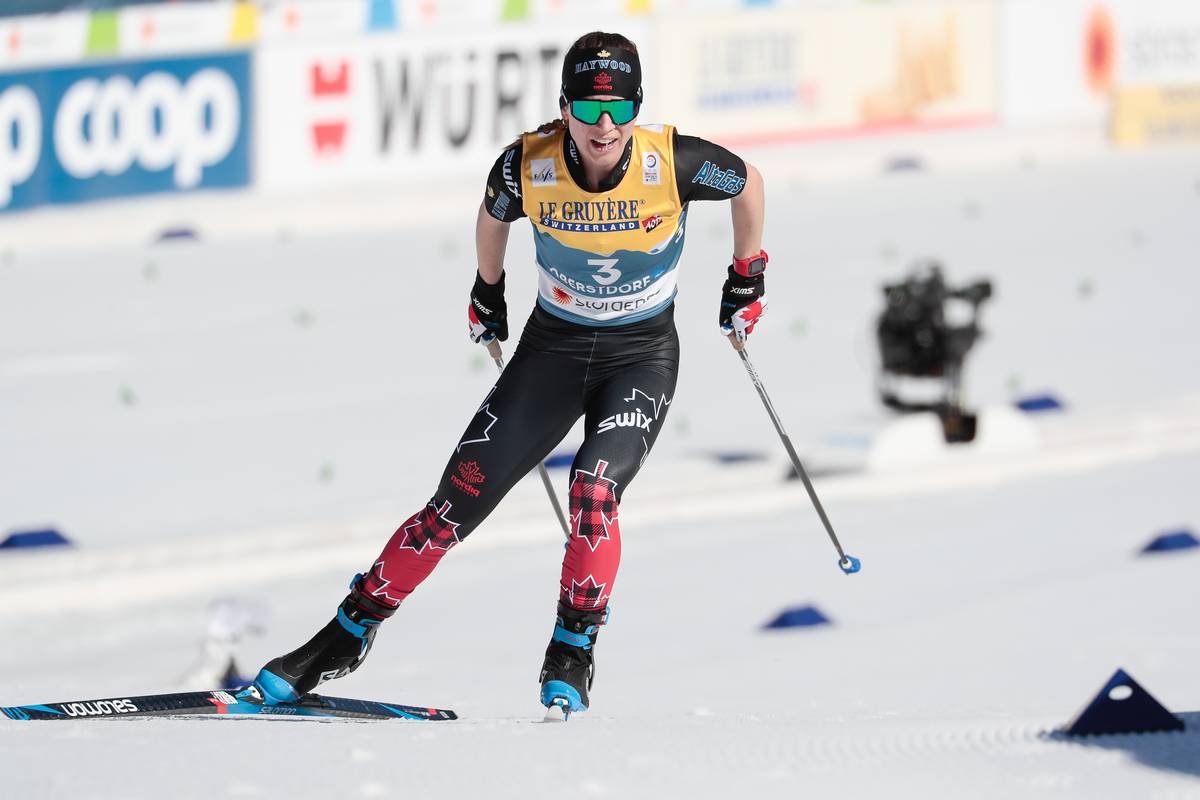
Canada’s Cendrine Browne, who began in bib 3, notched 27th (+2:32.5) for Canada’s best result.
“I am happy with today’s race. I was aiming for top-20 and was so close – just 12 seconds off,” said Browne to Nordiq Canada. “I just died on the second lap so I know that in a better day top-20 is definitely something I can achieve.”
According to Nordiq Canada, this is Browne’s seventh top-30 at the World Cup level. “I just died on the second lap so I know that in a better day top-20 is definitely something I can achieve. Overall, I couldn’t ask for a better season. Being this consistent in every race is a dream come true, and I’m proud of how I’m performing even though I had a concussion in September and contacted COVID in November.”
Dahria Beatty was 44th (+3:16.2), and Laura LeClair 57th (+4:52.1)
Jason Albert
Jason lives in Bend, Ore., and can often be seen chasing his two boys around town. He’s a self-proclaimed audio geek. That all started back in the early 1990s when he convinced a naive public radio editor he should report a story from Alaska’s, Ruth Gorge. Now, Jason’s common companion is his field-recording gear.



